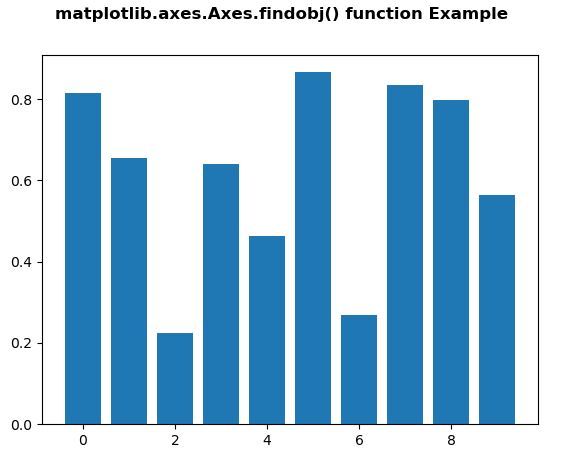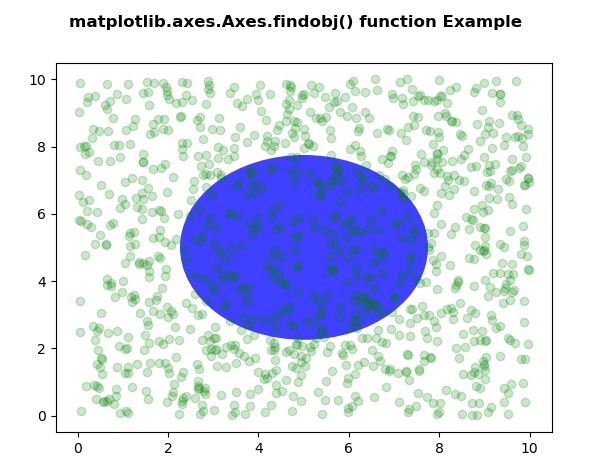Matplotlib是Python中的一个库,它是数字的-NumPy库的数学扩展。轴类包含大多数图形元素:Axis,Tick,Line2D,Text,Polygon等,并设置坐标系。 Axes实例通过callbacks属性支持回调。
matplotlib.axes.Axes.findobj()函数
matplotlib库的axes模块中的Axes.findobj()函数用于查找艺术家对象。
用法: Axes.findobj(self, match=None, include_self=True)
参数:此方法接受以下参数。
- match:此参数是匹配的过滤条件。默认值为无。
- include_self:此参数将self包含在要检查是否匹配的列表中。
返回值:此方法返回艺术家(艺术家列表)。
以下示例说明了matplotlib.axes中的matplotlib.axes.Axes.findobj()函数:
范例1:
# Implementation of matplotlib function
import matplotlib.pyplot as plt
from matplotlib.lines import Line2D
import numpy as np
from numpy.random import rand
fig, ax2 = plt.subplots()
ax2.bar(range(10), rand(10), picker = True)
for label in ax2.get_xticklabels():
label.set_picker(True)
def onpick1(event):
if isinstance(event.artist, Line2D):
thisline = event.artist
xdata = thisline.get_xdata()
ydata = thisline.get_ydata()
ind = event.ind
print('onpick1 line:',
np.column_stack([xdata[ind],
ydata[ind]]))
elif isinstance(event.artist, Rectangle):
patch = event.artist
print('onpick1 patch:', patch.get_path())
elif isinstance(event.artist, Text):
text = event.artist
print('onpick1 text:', text.get_text())
print("Value return:\n", *list(ax2.findobj()), sep ="\n")
fig.suptitle('matplotlib.axes.Axes.findobj() function Example',
fontweight ="bold")
plt.show()输出:

Value return: Rectangle(xy=(-0.4, 0), width=0.8, height=0.815228, angle=0) Rectangle(xy=(0.6, 0), width=0.8, height=0.655121, angle=0) Rectangle(xy=(1.6, 0), width=0.8, height=0.225002, angle=0) Rectangle(xy=(2.6, 0), width=0.8, height=0.639457, angle=0) Rectangle(xy=(3.6, 0), width=0.8, height=0.463923, angle=0) Rectangle(xy=(4.6, 0), width=0.8, height=0.865994, angle=0) Rectangle(xy=(5.6, 0), width=0.8, height=0.269864, angle=0) Rectangle(xy=(6.6, 0), width=0.8, height=0.834427, angle=0) Rectangle(xy=(7.6, 0), width=0.8, height=0.79638, angle=0) Rectangle(xy=(8.6, 0), width=0.8, height=0.564809, angle=0) Spine Spine Spine Spine Text(0.5, 0, '') Text(1, 0, '') Line2D() Line2D() Line2D((0, 0), (0, 1)) Text(0, 0, '') Text(0, 1, '') Line2D() Line2D() Line2D((0, 0), (0, 1)) Text(0, 0, '') Text(0, 1, '') Line2D() Line2D() Line2D((0, 0), (0, 1)) Text(0, 0, '') Text(0, 1, '') Line2D() Line2D() Line2D((0, 0), (0, 1)) Text(0, 0, '') Text(0, 1, '') Line2D() Line2D() Line2D((0, 0), (0, 1)) Text(0, 0, '') Text(0, 1, '') Line2D() Line2D() Line2D((0, 0), (0, 1)) Text(0, 0, '') Text(0, 1, '') Line2D() Line2D() Line2D((0, 0), (0, 1)) Text(0, 0, '') Text(0, 1, '') XAxis(80.0, 52.8) Text(0, 0.5, '') Text(0, 0.5, '') Line2D() Line2D() Line2D((0, 0), (1, 0)) Text(0, 0, '') Text(1, 0, '') Line2D() Line2D() Line2D((0, 0), (1, 0)) Text(0, 0, '') Text(1, 0, '') Line2D() Line2D() Line2D((0, 0), (1, 0)) Text(0, 0, '') Text(1, 0, '') Line2D() Line2D() Line2D((0, 0), (1, 0)) Text(0, 0, '') Text(1, 0, '') Line2D() Line2D() Line2D((0, 0), (1, 0)) Text(0, 0, '') Text(1, 0, '') Line2D() Line2D() Line2D((0, 0), (1, 0)) Text(0, 0, '') Text(1, 0, '') YAxis(80.0, 52.8) Text(0.5, 1.0, '') Text(0.0, 1.0, '') Text(1.0, 1.0, '') Rectangle(xy=(0, 0), width=1, height=1, angle=0) AxesSubplot(0.125, 0.11;0.775x0.77)
范例2:
# Implementation of matplotlib function
import numpy as np
import matplotlib.pyplot as plt
import matplotlib.patches as mpatches
fig, ax = plt.subplots()
x, y = 10 * np.random.rand(2, 1000)
ax.plot(x, y, 'go', alpha = 0.2)
circ = mpatches.Circle((0.5, 0.5), 0.25,
transform = ax.transAxes,
facecolor ='blue',
alpha = 0.75)
ax.add_patch(circ)
print("Value return:\n", *list(ax.findobj()),
sep ="\n")
fig.suptitle('matplotlib.axes.Axes.findobj()\
function Example', fontweight ="bold")
plt.show()输出:

Value return: Circle(xy=(0.5, 0.5), radius=0.25) Line2D(_line0) Spine Spine Spine Spine Text(0.5, 0, '') Text(1, 0, '') Line2D() Line2D() Line2D((0, 0), (0, 1)) Text(0, 0, '') Text(0, 1, '') Line2D() Line2D() Line2D((0, 0), (0, 1)) Text(0, 0, '') Text(0, 1, '') Line2D() Line2D() Line2D((0, 0), (0, 1)) Text(0, 0, '') Text(0, 1, '') Line2D() Line2D() Line2D((0, 0), (0, 1)) Text(0, 0, '') Text(0, 1, '') Line2D() Line2D() Line2D((0, 0), (0, 1)) Text(0, 0, '') Text(0, 1, '') Line2D() Line2D() Line2D((0, 0), (0, 1)) Text(0, 0, '') Text(0, 1, '') Line2D() Line2D() Line2D((0, 0), (0, 1)) Text(0, 0, '') Text(0, 1, '') Line2D() Line2D() Line2D((0, 0), (0, 1)) Text(0, 0, '') Text(0, 1, '') XAxis(80.0, 52.8) Text(0, 0.5, '') Text(0, 0.5, '') Line2D() Line2D() Line2D((0, 0), (1, 0)) Text(0, 0, '') Text(1, 0, '') Line2D() Line2D() Line2D((0, 0), (1, 0)) Text(0, 0, '') Text(1, 0, '') Line2D() Line2D() Line2D((0, 0), (1, 0)) Text(0, 0, '') Text(1, 0, '') Line2D() Line2D() Line2D((0, 0), (1, 0)) Text(0, 0, '') Text(1, 0, '') Line2D() Line2D() Line2D((0, 0), (1, 0)) Text(0, 0, '') Text(1, 0, '') Line2D() Line2D() Line2D((0, 0), (1, 0)) Text(0, 0, '') Text(1, 0, '') Line2D() Line2D() Line2D((0, 0), (1, 0)) Text(0, 0, '') Text(1, 0, '') Line2D() Line2D() Line2D((0, 0), (1, 0)) Text(0, 0, '') Text(1, 0, '') YAxis(80.0, 52.8) Text(0.5, 1.0, '') Text(0.0, 1.0, '') Text(1.0, 1.0, '') Rectangle(xy=(0, 0), width=1, height=1, angle=0) AxesSubplot(0.125, 0.11;0.775x0.77)
相关用法
注:本文由纯净天空筛选整理自SHUBHAMSINGH10大神的英文原创作品 Matplotlib.axes.Axes.findobj() in Python。非经特殊声明,原始代码版权归原作者所有,本译文未经允许或授权,请勿转载或复制。
